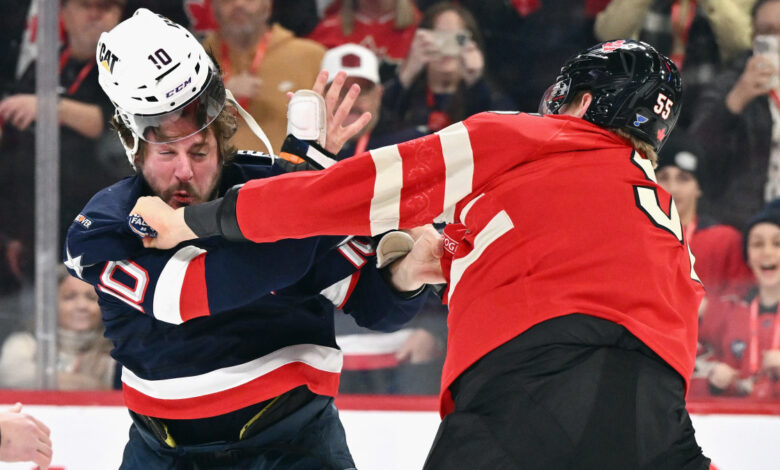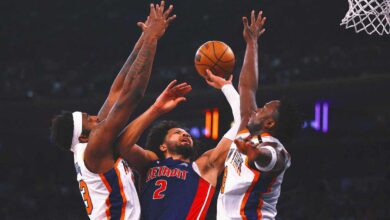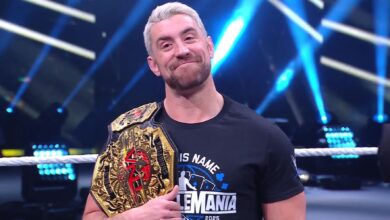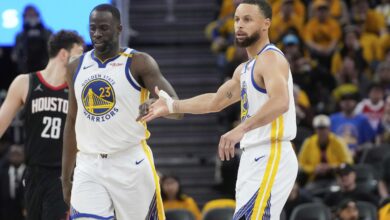Ice Hockey news 2025 | 4 Nations Face-Off final, Canada vs USA, fights; Why is fighting allowed in Ice Hockey?

When the USA and Canada faced off at the 4 Nations Face-Off on Sunday (AEDT), the tension was palpable. Not for nine years had the NHL’s best players been part of an international tournament.
Then two seconds in, it was gloves off between the USA’s Matthew Tkachuk and Canada’s Brandon Hagel.
The Canadians call it “our game”, and in the lead up Tkachuk had said “it’s our time”.
READ MORE: Raducanu thanks fans for support after incident with ‘fixated’ man
READ MORE: Superstar recruits’ value laid bare by NRL top 50 votes
READ MORE: ‘Disastrous’ Dragons scenario looms after twin decisions
Throw in the backdrop of political tensions and the booing of the US anthem by a Montreal crowd, fireworks were sure to fly.
The battle between Tkachuk and Hagel wasn’t the end of it.
Brady Tkachuk and Sam Bennett were next when the puck dropped before JT Miller and Colton Parayko followed.
Noticeably, the two Tkachuck brothers high-fived after it all. The siblings have a reputation for their physicality in the rink and their father, Keith, had the same style, having represented the USA in 1996.
What really mattered was the score, and it went the way of the USA, 3-1.

J.T. Miller #10 of Team USA and Colton Parayko #55 of Team Canada fight. Getty
Now the rivalry will be revisited in Boston, with the championship title on the line in the tournament final on Friday morning Australian time.
For many Australians watching on during that first match between the two, the question may have been: how is this fighting allowed?
Firstly let’s look back at the history.
USA vs Canada, a modern-day timeline
At the 2002 Salt Lake Olympics, Canada won the gold medal against the USA. The same result followed in 2010 in Vancouver. Once again, Canada won in 2014, however the USA finished fourth. Since the 2014 Winter Olympics, the NHL has not sent players to the event.
It’s a different story in the Stanley Cup though, which goes to the winner of the National Hockey League.
Not since 1993 has a Canadian team won the Cup when the Montreal Canadiens claimed the title. Back then, Whitney Houston’s ‘I Will Always Love You’ was topping the charts. Much of this is to do with the fact only seven of the 32 NHL teams call Canada home.

Montreal Canadiens celebrate with the Stanley Cup in 1993. NHLI via Getty Images
Last year, the Edmonton Oilers looked like they may break the drought but lost 4-3 to Florida Panthers.
Overall, Canadian teams have won 49 Stanley Cups. US teams have claimed 54.

The Florida Panthers pose with the Stanley Cup after beating the Edmonton Oilers. TNS
Possibly the most relevant part of the rivalry in recent weeks has been the tit-for-tat between US and Canada around politics. US president Donald Trump has repeatedly called for Canada to become the 51st state, a notion deeply offensive to Canadians considering the 200 years of peaceful coexistence.
In his return on Last Week Tonight, famed comedian John Oliver, noted the stereotypically polite Canadians waited until the end to boo.
“I think the only thing more quintessentially Canadian than booing the US national anthem at a hockey game is the fact they waited politely for the right time to do it,” he said.
It seems NHL commissioner Gary Bettman couldn’t have timed it better to introduce the 2025 4-Nations Face Off.
To understand the tension, Wide World of Sports spoke with Sydney Bears defenseman Ryan Annesley, who has built a career across North America, Europe and Australia, having been born in Ajax, Ontario.
“I haven’t really seen a start to a game that emotional. The adrenaline was definitely pumping, even for me as a fan at home watching that,” he said.
“I wouldn’t say it (the fighting) was 100 per cent expected, no. People expected there to be some bad blood in the game but a start like that is rare.
“I think that’s part of where it comes from, nine years of no chance of best-on-best. Obviously there’s a long history of rivalry and just two teams that don’t want to back down from one another.”
Fighting explained
For any sporting fan with a slight interest in ice hockey, the concept of fighting isn’t unknown – so why is it allowed?
Well it’s not, technically.
Under the NHL rules, a five-minute penalty is given to a player who engages in fighting.
But that hasn’t stopped players from throwing down the gloves. Fighting has enormous entertainment value, evident by the attention that came from the first match between the USA and Canada.

Brady Tkachuk #7 of Team USA and Sam Bennett #9 of Team Canada fight. Getty
In many circumstances, fighting comes about because a player has hit a team’s superstar. From there, the opposition may bring out someone as an enforcer.
However, since the 80s it’s become less prevalent.
“I’ve seen lots, I’ve never been a big participant but I’ve seen a lot in my time,” Annesley said.
“As I got older, and rules changed and more information about CTE became available, it definitely happened less.
“(Having an enforcer) was more prevalent in the 80s and 90s, two or three teams have a dedicated tough guy but most guys now have to be able to play and if they have that element to them it’s a bonus.”
Is it the same in the Olympics?
The short answer is no.
The Olympics is run separate to the NHL by the International Ice Hockey Federation.
Rule 46 relates to fighting, and explicitly says “fighting is not part of international ice hockey’s DNA”.
A player engaging in fighting will be handed a major penalty and an automatic game misconduct penalty. The latter is a suspension from the game, but a player can replace the one removed. Essentially, your night is over if you drop the gloves.
Will it happen again?
With both countries now confirmed to play in the championship final.
The suspense will now heighten.
Will the gloves come off again? How many fights can we expect?
Annesley believes it’s likely the focus for both sides will be squarely on coming away with victory.
“It’s hard to say. I think had Canada’s roster been a little bit different and if they had a couple more guys that have that element to them, I think we could potentially see more fireworks but it’s tough to say, at the end of the day you want to win that tournament,” he said.
“These guys are the world’s best players, you don’t want them necessarily sitting in the box for five minutes.
“Moreso on the American side, if I was the coach I’d be telling the Tkachuk brothers, we need you on the ice rather than getting into the melee at the beginning again.
“But that being said the games now in Boston, Canada wants to send a message back so it’ll be interesting to see. I would love it if they did something like that.”
https://static.ffx.io/images/$zoom_1%2C$multiply_1%2C$ratio_1.777778%2C$width_4566%2C$x_0%2C$y_291/t_crop_custom/c_scale%2Cw_1200%2Cq_88%2Cf_auto/deefb85205231986895467b44dd83fbbba2762e7
2025-02-19 16:17:29




